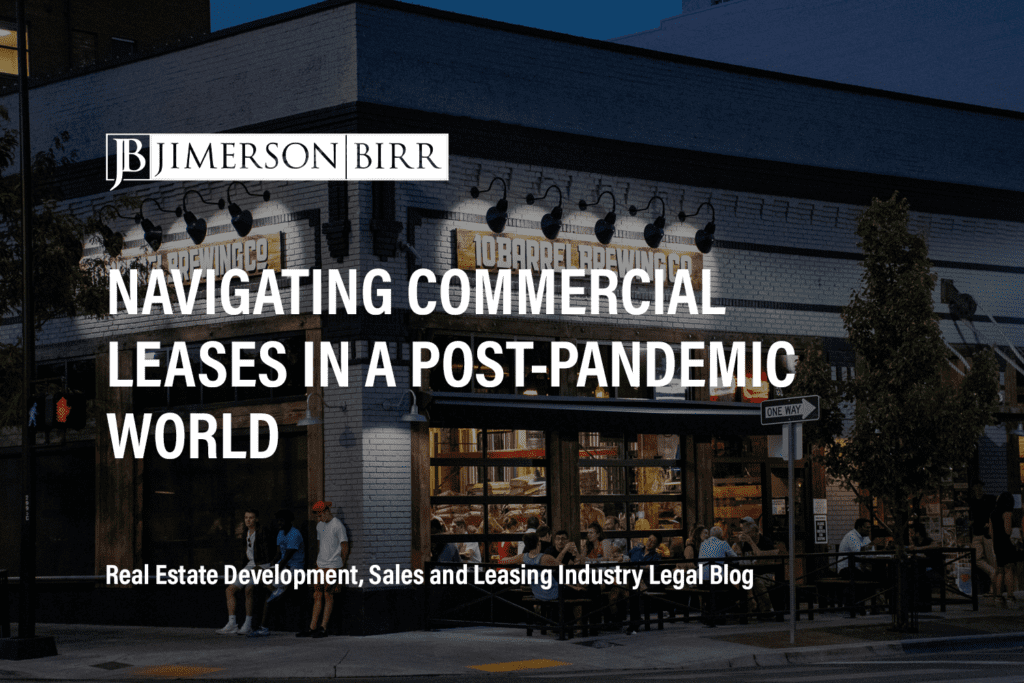The COVID-19 pandemic has had a dramatic and unprecedented impact on the commercial real estate market, requiring landlords and tenants to rethink their traditional lease clauses. While the post-COVID landscape is still uncertain and may take some time to fully recover, there are a few key lease clauses that should be included in every new or renewed commercial lease agreement.
Force Majeure Clause
A force majeure clause is an essential component of a commercial lease agreement and should be updated to account for any potential disruptions due to COVID-19 or any other national pandemic. This clause should protect both the tenant and the landlord from any damages resulting from the spread of a virus.
Termination Rights
Tenants should consider including a termination right in their commercial lease, allowing them to terminate the agreement if necessary due to their inability to operate as a result of government-mandated pandemic lockdowns. On the flipside, landlords should consider clauses that contain terms regarding proof of their tenant’s inability to operate or proof of a decline in revenues due to lockdowns or other pandemic related effects.
Rent Relief Opportunities
Recognizing the impact of COVID-19 on business operations, tenants should consider including provisions in their lease that provide rent relief in the event of certain pandemic-related circumstances. These provisions could include rent abatements or deferment, or temporary rent holidays. Likewise, landlords would likely want to include clauses mandating that any government-provided financial relief or assistance to their tenant be paid to the landlord for rent and any other monies due beneath a lease so to ensure their tenant doesn’t enjoy a windfall when government relief is provided.
Rent Abatement or Deferment
Rent abatement provisions provide that no rent is due from the tenant under certain circumstances. Most commonly, rent abatement provisions are included to encompass the first few months of a lease when build-out of the space occurs. Some commercial leases also offer rent abatements when a force majeure event causes the leased premises to be unusable for a period of time. Rent deferments allow tenants to effectively hit a pause button on their lease payments. Under a rent deferment, lease payments are paused for a period of time and the lease payments are effectively extended for the period of time during the deferment.
Rent abatement and deferment clauses are beneficial to tenants during pandemics and other similar events. These clauses provide the tenant a financial break by lowering their overhead, without causing a breach of their financial obligations. In pandemic times, rent abatements or deferments also have some benefit to landlords. While the landlord is not currently getting paid, it knows that there is a tenant to fill the space when payments begin, rather than receiving no rent and having no tenant when payments re-start.
Temporary Rent Holidays
A temporary rent holiday is a period of time during which the landlord agrees not to charge the tenant rent. A common example of a rent holiday would be an apartment complex offering the first month free of rent. Including a temporary rent holiday in the event of pandemic-related circumstances in a lease can protect tenants from the major financial hit to their business associated with a pandemic.
Mandated Payment of Government-financial Relief
During the COVID-19 pandemic, many government-sponsored programs were provided to small businesses to help them stay afloat. Many of these programs included specific grants, loans, and other aid to help small businesses pay their rents. Including a lease clause requiring that government-financial relief and aid be utilized to pay rent can protect landlords from tenants who receive aid, while at the same time, refusing to pay rent. Additionally, these clauses can give the landlord peace of mind that, if a pandemic or pandemic-related event occurs, they are more likely to be paid by their tenants.
Alternative Payments
As many businesses have experienced significant cash flow disruptions due to the pandemic, landlords should consider offering tenants flexible payment arrangements that would enable tenants to pay their rent over an extended period of time. This will enable tenants to maintain their lease agreements without the risk of defaulting on their rent payments.
Conclusion
These post-COVID lease clauses should be tailored to fit the unique circumstances of each commercial lease agreement as the implications of the pandemic continue to evolve. Commercial lease negotiations are not uncommon, and working with a reputable and experienced real estate advisor can help ensure that your commercial lease agreement adequately protects all parties involved. Whether you are a landlord or a tenant, the real estate attorneys at Jimerson Birr can help you navigate commercial lease negotiations or review your lease to ensure you are protected.

